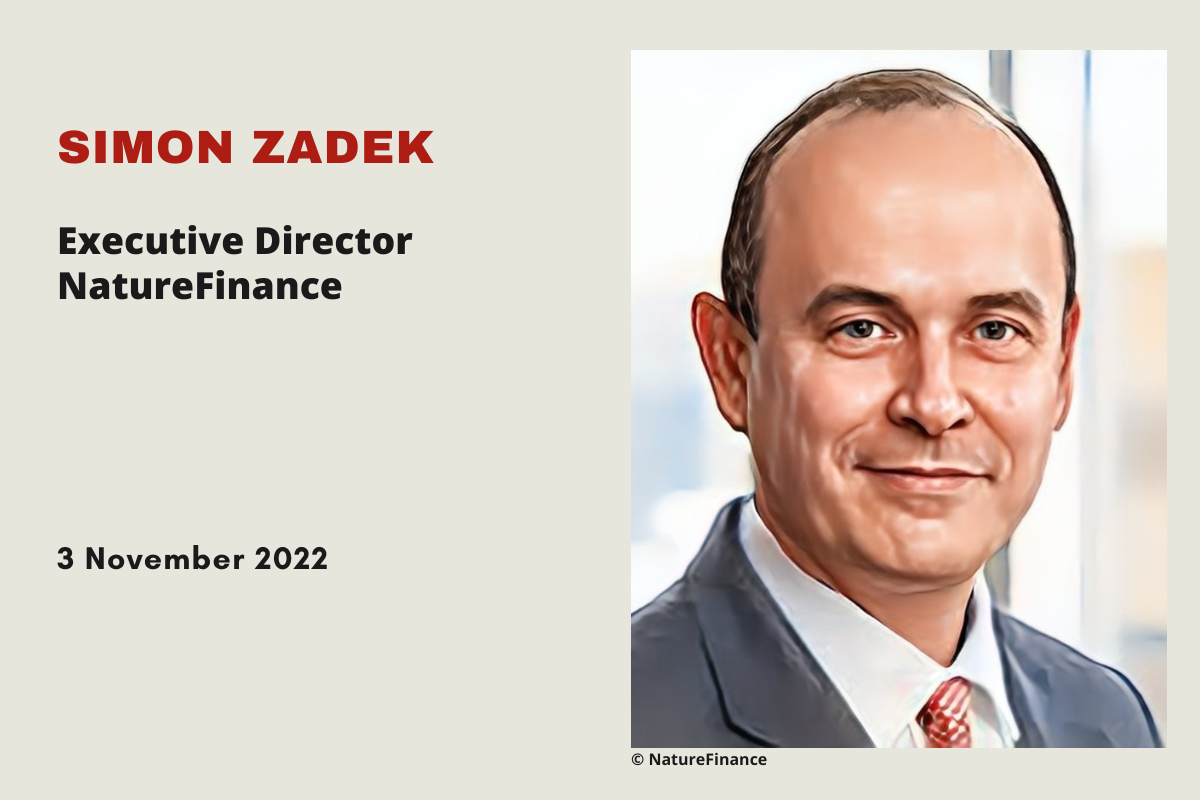The Interview | Simon Zadek
 |
How would you present your organization in a few words? What entails your position? What is your goal? |
Nature is everything, and finance is everything else, so the main task is to drive radical change at the nexus of nature and finance. That is why NatureFinance exists, with a mandate to do what it takes to align global finance with nature positive outcomes and the equitable distribution of their economic benefits. Tackling climate change and reversing nature’s endangered state needs a reset of the nexus between nature and finance.
There is a historic, and necessary, opportunity to reshape businesses, economies and markets to ensure the just transition to equitable, nature positive, net zero outcomes. NatureFinance is placing nature at the heart of global finance, from sovereign debt markets to early-stage investor ecosystems, risk-related metrics, food system transition and anti-money laundering. Our underlying philosophy is we can achieve this working collaboratively with the best technical, market and policy expertise, wherever it is found.
 |
Among the concentration of actors in Geneva (IOs, NGOs, permanent missions, academia, and the private sector), who do you work with and how? |
The task that NatureFinance is taking on is vast, and achieving it is well beyond the scope of the small team we intend to gather. So virtually everything we do will be done through partnerships – including partnerships where NatureFinance is a secondary player. We plan to initiate and, in some cases, spin-off specialised initiatives such as our Sustainability-Linked Sovereign Debt Hub and our Taskforce on Nature Markets, both established in partnership with members of the relevant ecosystems. We recently announced the Nature Investor Circle, a collaborative effort with The Landbanking group, Planet A and Pale Blue Dot established to support the needs of early-stage investors in nature positive ventures. We also launched the Biodiversity Index Partnership in partnership with SEED and the Crowther Lab at ETH in Zurich, to design, develop and execute a robust, sustainable and financially viable biodiversity index for use in global markets.
We wish to work directly with market players – banks, investors, and innovators – in expanding the market for nature-positive business opportunities. For example, we are engaging with indigenous leaders working on the ground to protect nature, leading researchers in these topics, and the broader network of change actors looking to create a more nature-positive future. We see the first range of partnerships being largely in the Swiss environment. We are also intent on connecting institutions in Geneva (and elsewhere in Switzerland) with key players in other parts of the world, and particularly in developing and emerging economies. We know that transformative change can happen only through collaborative networks.
 |
What are the strengths and weaknesses of Geneva with regards to the development of your activity? |
Geneva has a number of unique advantages offered nowhere else in the world. It is a leading center in responsible investment and in micro-finance in the financial world. It plays a vital role in wealth management, opening the possibility of working with high-net-worth individuals and family offices concerned by nature destruction. It is one of the world’s leading centers for international cooperation – the global technical and operational capital of the UN’s efforts to implement the SDGs. It is also home to some of the world’s leading nature conservation organizations, as well as leading networks of businesses committed to sustainable development. Further, the broader Swiss ecosystem includes some leading research and teaching institutions, many working on sustainable finance. With all of these features, Geneva is the nature finance global hub of excellence.
Geneva has it all, the question is whether its strengths can be mobilised and directed towards our pressing challenges, whether urgency and potential can overcome the speed bumps of risk aversity and convention.
 |
|
Nature is the foundation of our $95 trillion global economy, yet it faces unprecedented collapse, damaging efforts to address climate goals. We need to align global finance with a thriving, regenerated nature and this has clear implications for rules, setting standards, and governance at local, sovereign and international levels.
Policymakers, legislators and financial regulators are just beginning to get their heads around what this meta-dependency on nature means for the financial system and to the autonomy of jurisdictional entities. We need to integrate nature stewardship into how we measure and define business and sovereign performance; we need effective rules to prevent nature crimes; and we need entities that can detect and mitigate how system rules can be manipulated.
Equally challenging, because nature physically crosses jurisdictions, and the implications of eroded nature effect cross-border economic, social and physical conditions, we need to have trans-jurisdictional, or inter-national governance bodies or failing that processes that have the power to measure, hold entities accountable, and reward and penalize entities based on their impact on nature.
Positively, there are important developments in this space. Work is advancing on the place of nature in financial stability and prudential regulation, as well as a host of new rules connecting nature impacts to everything from trade and investment to money laundering rules. Deforestation due diligence requirements will globalize along supply chains, as will basic disclosure requirements.
Such developments are progress, but as we all know too little, and in some cases too late. Speed-to-scale is the name of the game, and this requires a dynamic, entrepreneurial to governance innovation, often involving unilateral or plurilateral, rather than classical but harder to close and more cumbersome multilateral deals and initiatives. Indeed, the most important form of innovations in the coming years will need to be in governance.
 |
|
The question I do not like to be asked is whether I am optimistic or pessimistic. Optimism is a strategic decision that gets us out of bed and drives us to act. Accusations of pessimism are too often levelled at those who seek to portray blunt realism. I am in favor of honesty with myself and others as this is what makes it more likely that one’s chosen actions are likely to be well targeted to make a difference.
So maybe the missing question is “are you honest”.
Today we live in a world that understandably makes us anxious, but true anxiety lies in the hearts and minds of younger people such as my 18-year-old daughter. She is extraordinary and wants to live an extraordinary life, but fears that the failures of previous generations, mostly the Baby Boomers, may have made that future impossible.
So maybe the missing question is how far we are willing to go to ensure that my daughter and billions of others have the possibility of that or any future.
